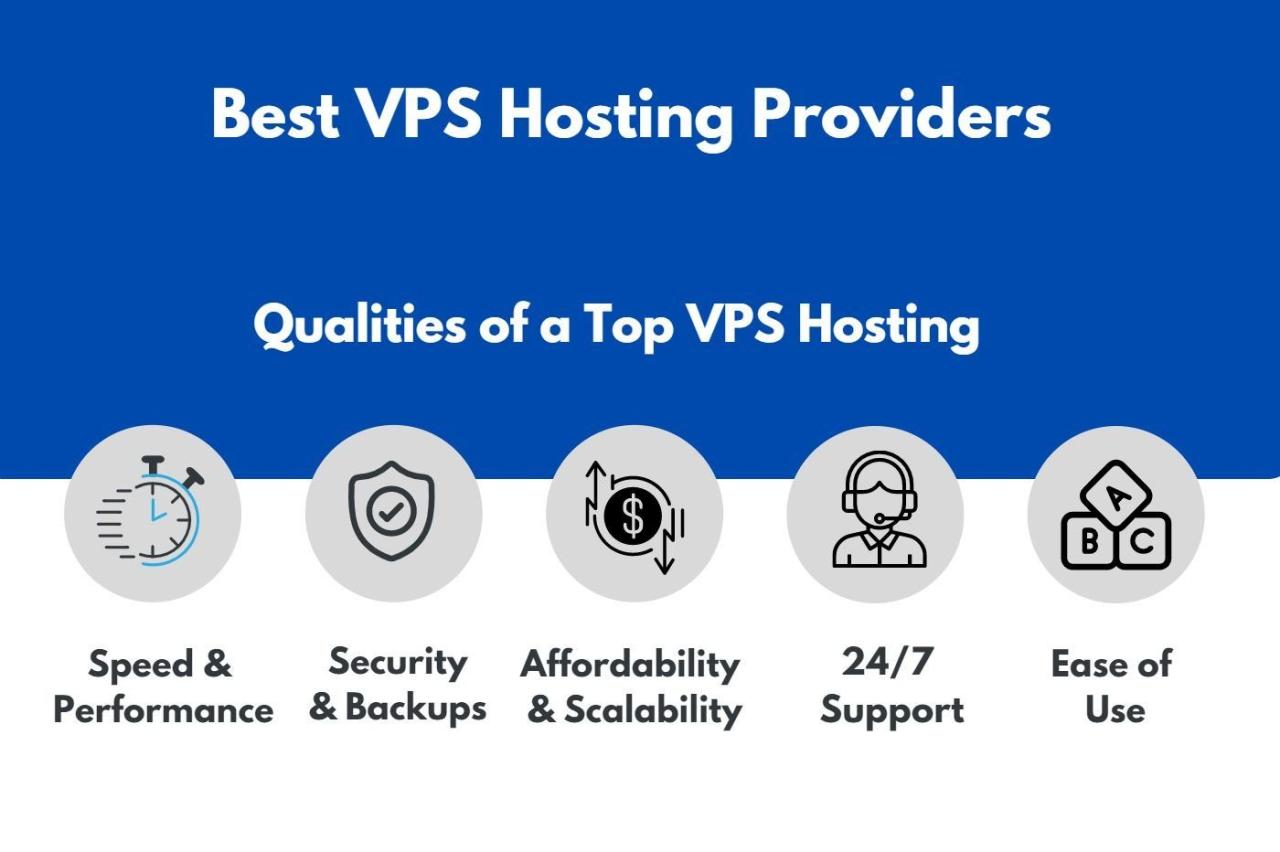The best VPS host can be a game-changer for your website, offering superior performance and flexibility compared to shared hosting. Whether you’re a growing business, a developer building complex applications, or an individual with a high-traffic website, a VPS can provide the dedicated resources and control you need to thrive online.
Choosing the right VPS host requires careful consideration of factors like server location, resources, bandwidth, security, and support. By understanding these key aspects, you can make an informed decision that aligns with your specific website requirements and budget.
Introduction to VPS Hosting
VPS hosting, or Virtual Private Server hosting, is a type of web hosting that provides users with a virtualized server environment. This means that each VPS user gets their own dedicated resources, such as RAM, CPU, and storage, within a larger physical server. This separation of resources allows for greater performance, security, and flexibility compared to shared hosting, where multiple websites share the same server resources.
VPS hosting is ideal for websites and applications that require more resources and control than shared hosting can provide. This includes businesses, developers, and individuals with high traffic websites or those running resource-intensive applications.
Benefits of VPS Hosting
VPS hosting offers several benefits over shared hosting, making it a suitable choice for various users and applications.
- Dedicated Resources: Unlike shared hosting, where resources are shared among multiple websites, VPS hosting provides dedicated resources to each user. This ensures that your website or application has the resources it needs to perform optimally, without being affected by other users on the same server.
- Improved Performance: With dedicated resources, VPS hosting offers significantly better performance compared to shared hosting. Websites and applications load faster, experience fewer downtime issues, and can handle higher traffic volumes more effectively.
- Enhanced Security: VPS hosting provides a more secure environment than shared hosting. Since users have their own isolated virtual server, they are less susceptible to security breaches caused by other users on the same physical server. This is particularly important for websites that handle sensitive data.
- Root Access and Flexibility: VPS hosting grants users root access, giving them full control over their server environment. This allows users to customize their server, install software, and configure settings according to their specific needs. This flexibility is crucial for developers and businesses with specific technical requirements.
- Scalability: VPS hosting allows users to easily scale their resources as their website or application grows. This means they can upgrade their VPS plan to accommodate increased traffic and resource demands, ensuring their website remains performant and reliable.
Types of VPS Hosting
VPS hosting comes in various flavors, each offering different levels of control and support. Understanding the differences between these types is crucial for selecting the best fit for your specific needs.
Managed vs. Unmanaged VPS Hosting, Best vps host
The primary distinction in VPS hosting lies in the level of management provided by the hosting provider. Managed VPS hosting involves the provider handling essential server tasks like operating system updates, security patches, and server maintenance. Conversely, unmanaged VPS hosting places these responsibilities on the user, granting them complete control over the server environment.
Benefits of Managed VPS Hosting
- Simplified Server Management: Managed VPS hosting eliminates the need for technical expertise in server administration, allowing users to focus on their core business operations.
- Enhanced Security: Providers actively monitor and update security measures, reducing the risk of vulnerabilities and attacks.
- Increased Uptime: Regular maintenance and proactive monitoring ensure optimal server performance and minimize downtime.
- Expert Support: Dedicated support teams are readily available to assist with technical issues and troubleshooting.
Drawbacks of Managed VPS Hosting
- Higher Costs: The additional management services come at a premium, making managed VPS hosting more expensive than unmanaged options.
- Limited Customization: The provider’s managed environment may impose certain limitations on server configurations and software installations.
- Potential Dependence: Relying on the provider for server management can lead to a dependency that might hinder flexibility and control.
Benefits of Unmanaged VPS Hosting
- Cost-Effectiveness: Unmanaged VPS hosting offers a more affordable option, as users assume the responsibility for server management.
- Complete Control: Unmanaged VPS hosting provides full autonomy over the server environment, enabling users to customize configurations and install any desired software.
- Flexibility and Scalability: Users have the freedom to adjust server resources and configurations as needed, ensuring optimal performance for their specific requirements.
Drawbacks of Unmanaged VPS Hosting
- Technical Expertise Required: Managing an unmanaged VPS server demands a strong understanding of server administration and troubleshooting.
- Increased Responsibility: Users are responsible for all server maintenance, security updates, and backups, requiring time and effort.
- Potential Downtime: Improper server management or security vulnerabilities can lead to downtime and service interruptions.
Types of VPS Virtualization Technologies
VPS hosting relies on virtualization technologies to create isolated virtual environments on a physical server. Different virtualization technologies offer varying levels of performance, resource utilization, and compatibility.
KVM (Kernel-based Virtual Machine)
KVM is a widely adopted virtualization technology that leverages the Linux kernel to create virtual machines. Its key advantages include:
- High Performance: KVM offers excellent performance due to its direct integration with the host operating system.
- Resource Efficiency: KVM efficiently utilizes hardware resources, making it a cost-effective virtualization solution.
- Open Source: KVM is an open-source technology, providing users with access to its source code and enabling customization.
OpenVZ (Open Virtualization)
OpenVZ is a container-based virtualization technology that provides a lightweight and efficient approach to creating virtual environments. Its main features include:
- Resource Optimization: OpenVZ utilizes a shared kernel, minimizing resource consumption and maximizing server utilization.
- Fast Deployment: OpenVZ enables quick and easy deployment of virtual machines, making it suitable for rapid scaling.
- Cost-Effectiveness: OpenVZ’s efficient resource utilization and lightweight architecture contribute to its cost-effectiveness.
Xen
Xen is a hypervisor-based virtualization technology that offers a robust and scalable solution for creating virtual machines. Its key benefits include:
- Scalability: Xen supports large-scale virtualization deployments, making it suitable for hosting a high number of virtual machines.
- Security: Xen provides strong security features, including hardware-level isolation and access control mechanisms.
- Flexibility: Xen offers a wide range of customization options, allowing users to tailor the virtualization environment to their specific needs.
Considerations for Choosing a VPS Hosting Type
The choice between managed and unmanaged VPS hosting depends on various factors, including:
- Technical Expertise: Users with limited server administration experience should opt for managed VPS hosting, while those with technical skills can benefit from unmanaged VPS hosting.
- Budget: Managed VPS hosting typically incurs higher costs due to the additional management services, while unmanaged VPS hosting offers a more affordable option.
- Control and Flexibility: Unmanaged VPS hosting provides complete control over the server environment, while managed VPS hosting offers a more restricted but simpler approach.
- Time Commitment: Managing an unmanaged VPS server requires significant time and effort for maintenance and updates, while managed VPS hosting frees up users’ time.
- Security Requirements: Managed VPS hosting offers enhanced security features, while unmanaged VPS hosting relies on user-implemented security measures.
Performance Optimization for VPS Hosting

Optimizing VPS server performance is crucial for ensuring a smooth and efficient user experience. Techniques like caching, database optimization, and content delivery networks (CDNs) can significantly enhance your website’s speed and responsiveness.
Monitoring VPS Server Performance
Monitoring VPS server performance is essential for identifying potential bottlenecks and proactively addressing issues. Monitoring tools can provide insights into various metrics, including CPU usage, memory consumption, disk I/O, and network traffic.
- Resource Utilization: Tracking CPU, memory, and disk usage helps identify resource-intensive processes or potential memory leaks. High CPU usage can indicate inefficient code or excessive resource demands.
- Network Performance: Monitoring network traffic, latency, and bandwidth usage can reveal issues related to slow connections or network congestion.
- Website Response Time: Monitoring website response time provides insights into the overall performance of your application and identifies potential slowdowns.
Configuring a VPS Server for Optimal Performance
Configuring a VPS server for optimal performance requires understanding your website’s specific needs and resource requirements.
- Operating System Optimization: Choosing the right operating system (OS) and optimizing its settings can significantly impact performance. For example, using a lightweight Linux distribution like Ubuntu or Debian can reduce resource consumption compared to heavier alternatives.
- Software Optimization: Installing and configuring software efficiently is crucial for performance. Use optimized software versions and configurations to minimize resource usage and improve efficiency.
- Security Measures: Implementing security measures like firewalls and intrusion detection systems (IDS) can protect your VPS server from attacks and ensure its stability.
Scaling VPS Hosting: Best Vps Host

Scaling VPS hosting is essential for websites experiencing growth in traffic and data demands. As your website expands, your VPS needs to adapt to handle the increased workload. This section explores the options and considerations for scaling VPS hosting to ensure optimal performance and reliability.
Upgrading to a Larger VPS Plan
Upgrading to a larger VPS plan is a straightforward approach to scaling. This involves choosing a plan with more resources, such as CPU cores, RAM, and storage space. The increased resources can handle higher traffic volumes and improve website responsiveness. Most VPS providers offer a range of plans with varying resource allocations, allowing you to select the plan that best suits your website’s current and projected needs.
Adding More Servers
For websites experiencing significant traffic surges, adding more servers can be a more effective solution. This involves deploying additional VPS instances and configuring them to work together. A load balancer can distribute traffic across the servers, ensuring that no single server is overwhelmed. Adding more servers can provide a significant performance boost, particularly for websites with high traffic spikes or complex applications.
Migrating a Website to a Larger VPS Server
Migrating a website to a larger VPS server involves transferring all website files, databases, and configurations to the new server. This process can be complex, requiring careful planning and execution. It’s essential to ensure minimal downtime during the migration, especially for high-traffic websites. Some VPS providers offer migration assistance, making the process smoother and less disruptive. Here are some key steps involved in website migration:
- Backup Website Data: Before initiating the migration, create a complete backup of all website data, including files, databases, and configurations. This backup serves as a safety net in case of any issues during the migration process.
- Configure the New Server: Set up the new VPS server with the necessary software and configurations. This includes installing the web server, database server, and any other required applications.
- Transfer Website Files: Copy all website files from the old server to the new server. This can be done using FTP, SSH, or other file transfer methods.
- Migrate Databases: Migrate the website’s databases to the new server. This may involve exporting and importing the database or using specialized database migration tools.
- Update DNS Settings: Update the DNS settings to point to the new server’s IP address. This allows users to access the website from the new server.
- Test and Verify: After the migration, thoroughly test the website to ensure everything is functioning correctly. Verify that all website features, content, and functionalities are accessible and working as expected.
Considerations for Scaling VPS Hosting
Scaling VPS hosting requires careful consideration of factors such as website growth, traffic patterns, and budget. Here are some key considerations:
- Website Growth: Project future website growth and estimate the resources required to handle the anticipated traffic and data demands. This projection helps determine the appropriate VPS plan or server configuration.
- Traffic Patterns: Analyze website traffic patterns to identify peak hours and potential traffic spikes. This information helps optimize server resources and ensure smooth performance during periods of high demand.
- Budget: Consider the cost of scaling VPS hosting, including the cost of larger VPS plans, additional servers, and potential migration services. Balance the need for scalability with budget constraints to find the most cost-effective solution.
VPS Hosting for Specific Use Cases
VPS hosting is a versatile solution that can cater to a wide range of website needs. Choosing the right VPS hosting plan for your specific website type is crucial for optimal performance and scalability. This section explores how VPS hosting can be used for different website types, including e-commerce websites, blogs, and gaming servers, and discusses the specific requirements and recommendations for choosing the right plan.
E-commerce Websites
E-commerce websites require robust performance and security to handle high traffic volumes, secure transactions, and manage inventory. VPS hosting provides the necessary resources to meet these demands.
- High Bandwidth and Storage: E-commerce websites often have large product catalogs, high-resolution images, and extensive content. VPS hosting offers ample bandwidth and storage capacity to accommodate these requirements.
- Security Measures: Secure Socket Layer (SSL) certificates, firewalls, and regular security updates are essential for protecting sensitive customer data. VPS hosting provides a secure environment with advanced security features.
- Scalability: E-commerce websites experience peak traffic during promotional periods or sales events. VPS hosting allows for easy scaling of resources to handle temporary traffic surges.
Choosing the right VPS hosting plan for an e-commerce website depends on factors such as the expected traffic volume, product catalog size, and security requirements. It’s recommended to choose a plan with sufficient RAM, CPU cores, storage space, and bandwidth to support the website’s needs.
Blogs
Blogs are dynamic websites that require a balance of performance, affordability, and scalability. VPS hosting offers a cost-effective solution for bloggers who need more control and flexibility than shared hosting.
- Resource Allocation: VPS hosting provides dedicated resources, ensuring that blog performance is not affected by other websites on the same server.
- Scalability: As a blog grows in popularity, the traffic volume may increase. VPS hosting allows for easy scaling of resources to accommodate the growing traffic.
- Cost-Effectiveness: VPS hosting is more affordable than dedicated servers, making it an attractive option for bloggers with moderate traffic levels.
When choosing a VPS hosting plan for a blog, consider factors such as the expected traffic volume, content size, and future growth plans. A plan with sufficient RAM, CPU cores, and storage space is recommended for optimal performance and scalability.
Gaming Servers
Gaming servers require high performance, low latency, and reliable connectivity to provide a smooth and enjoyable gaming experience. VPS hosting provides a dedicated environment with the resources necessary to meet these demands.
- Dedicated Resources: VPS hosting ensures that gaming servers have access to dedicated CPU cores, RAM, and storage space, minimizing performance issues caused by other websites on the same server.
- Low Latency: VPS hosting can be deployed in data centers located close to the target audience, reducing latency and improving the gaming experience.
- Customization: VPS hosting allows for customization of server settings and software installations to optimize performance for specific games and game modes.
Selecting the right VPS hosting plan for a gaming server depends on the game’s requirements, the number of players, and the desired performance level. Plans with high CPU cores, RAM, and bandwidth are essential for providing a smooth and lag-free gaming experience.
Final Summary
In conclusion, finding the best VPS host is crucial for optimizing website performance, scalability, and security. By considering your individual needs, budget, and the factors discussed in this guide, you can select a VPS provider that empowers your online success. Remember to research different providers, compare features and pricing models, and seek out reliable customer support for a seamless and rewarding experience.




